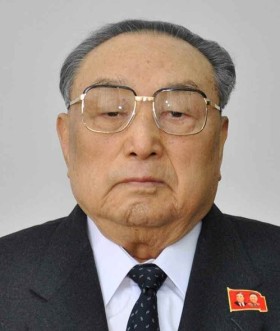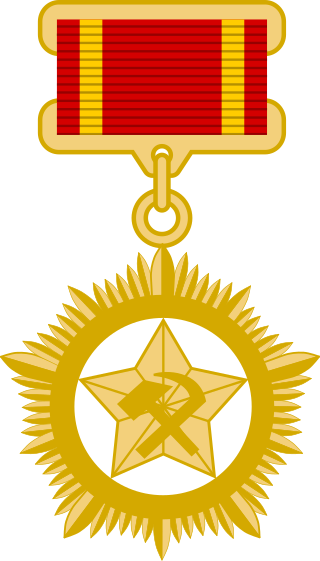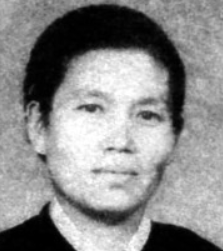
Kim Jong Il was a North Korean politician who was the second supreme leader of North Korea. He led North Korea from the death of his father Kim Il Sung in 1994 until his death in 2011, when he was succeeded by his son, Kim Jong Un. Afterwards, Kim Jong Il was declared Eternal General Secretary of the Workers' Party of Korea (WPK).

Kim Jong Suk was a Korean revolutionary, anti-Japanese guerrilla, Communist activist, the first wife of North Korean leader Kim Il Sung, the mother of former leader Kim Jong Il and grandmother of current leader Kim Jong Un.

Kim Jong Un is a North Korean politician who has been supreme leader of North Korea since December 2011 and the general secretary of the Workers' Party of Korea (WPK) since 2012. He is the third son of Kim Jong Il, who was the second supreme leader of North Korea, and a grandson of Kim Il Sung, the founder and first supreme leader of the country.
The award system of the Democratic People's Republic of Korea was initially created less than one month after the foundation of the Republic. During the years of Japanese occupation of Korea, many of the future leaders fled to the Soviet Union. During World War II many if not close to all party leaders and Korean People's Army commanders served in the Soviet Army and as such adopted many of the Soviet awards criteria for their own. During the late 1940s and until the Sino-Soviet Split in late 1958, orders and titles were made in the Soviet Money Mints in Moscow or Leningrad. Soviet made awards were modeled after Soviet orders and made of sterling silver. Initially the orders were attached to clothing with a screw-plate, but after Soviet production stopped, production was moved to North Korea. The screwback was replaced with a pin and the silver content was replaced with cheap tin. With the exception of a few examples of modern orders, Soviet and Czech KPA awards are the most sought after in current militaria markets.
Kim Kyong-hui is the aunt of current North Korean leader, Kim Jong Un. She is the daughter of the founding North Korean leader Kim Il Sung and the sister of the late leader Kim Jong Il. She currently serves as Secretary for Organization of the Workers' Party of Korea. An important member of Kim Jong Il's inner circle of trusted friends and advisors, she was director of the WPK Light Industry Department from 1988 to 2012. She was married to Jang Song-thaek, who was executed in December 2013 in Pyongyang, after being charged with treason and corruption.

Kim Yong Ju was a North Korean politician and the younger brother of Kim Il Sung, who ruled North Korea from 1948 to 1994. Under his brother's rule, Kim Yong Ju held key posts including Politburo member in the Workers' Party of Korea (WPK) during the 1960s and early 1970s, but he fell out of favour in 1974 following a power struggle with Kim Jong Il. From 1998 until his death in 2021, he held the ceremonial position of Honorary Vice President of the Presidium of the Supreme People's Assembly (SPA), North Korea's parliament.

The North Korean cult of personality surrounding the Kim family has existed in North Korea for decades and can be found in many examples of North Korean culture. Although not acknowledged by the North Korean government, many defectors and Western visitors state there are often stiff penalties for those who criticize or do not show "proper" respect for the former leaders of the country, Kim Il Sung and Kim Jong Il, officially referred to as "eternal leaders of Korea". The personality cult began soon after Kim Il Sung took power in 1948, and was greatly expanded after his death in 1994.

Ri Ul-sol was a North Korean politician and military official. He played an important role in the administrations of Kim Il Sung and Kim Jong Il, achieving the rank of marshal of the Korean People's Army. He was responsible for the safety of top North Korean leaders and their families as Commander of the Guard.

Kim Chol-man was a North Korean politician and military official. He was a member of several important committees and organizations, including the 6th Central Military Commission, the 6th Politburo, and the Second Economic Committee. He was at the forefront of the North Korean munitions industry, the country's economic base. In old age Kim was no longer considered a major player in North Korean politics, having retired from most of his important posts.
The People's Prize is a North Korean arts and sciences award. It is awarded by the People's Prize Awarding Commission, which is working directly under the Cabinet of North Korea. The prize can be granted to works of art or people. People's Prize has been an important award in the field of North Korean cinema.

Upon its liberation in 1945 and subsequent foundation in 1948, North Korea adopted national symbols distinct from the national symbols of South Korea. The traditional flag of Korea, the Taegukgi, and the symbol Taeguk, were swapped for socialist symbols.

The Order of Kim Il Sung (Korean: 김일성훈장) is the highest order of North Korea, along with the Order of Kim Jong Il, and only second to one honorary title, the Hero of Labour.

The Order of the National Flag is the second highest order of North Korea, after the Order of Kim Il Sung and the Order of Kim Jong Il.
The Kim Il Sung Prize (Korean: 김일성상) is an award given by the Government of North Korea to persons in various fields who demonstrate exemplary service to the values of Juche idea. Past winners include the Korean composer Kim Won-gyun, judoka Kye Sun-hui, and the Arirang Festival.

Labor Hero is one of the highest titles of honor of North Korea and the highest decoration of the country overall. The award was probably scheduled for establishment in the summer of 1950, but the Korean War postponed these plans. When the war had entered a phase of stalemate along the 38th parallel, the government had time to officially launch the decoration, originally under the name Korea Hero of Labor. 16 people were decorated Labor Heroes during the war and more since then. The decoration is based on its Soviet equivalent, Hero of Socialist Labour.

Hwang Sun-hui was a North Korean politician who served in several high-ranking positions in the Workers' Party of Korea (WPK), including in the Supreme People's Assembly and the Central Committee of the WPK. She was affiliated with the Korean Revolution Museum from 1965, and was its director from 1990.

Ri Yong-suk was a North Korean politician and revolutionary. A veteran of the anti-Japanese struggle, Ri had close relations with all three generations of the Kim dynasty. During WWII, she was with Kim Il Sung in the Soviet 88th Separate Rifle Brigade. During the Korean War, she took care of Kim Jong Il, eldest son and future heir of Kim Il Sung. Under Kim Jong Un, she was portrayed as a link between the original guerrilla generation and the current leadership. Ri was elected to the Supreme People's Assembly in 1998 and 2003.

The 8th Congress of the Workers' Party of Korea was held at the April 25 House of Culture in Pyongyang from 5 to 12 January 2021. A total of 7,000 people participated in the congress including 5,000 delegates. The Party Congress took place in the midst of the COVID-19 pandemic where no cases were reported.

This is a list of awards and decorations received by Kim Jong Il. According to North Korean sources, North Korea "conferred ... the title of Hero of the DPRK four times, the Order of Kim Il Sung four times, Kim Il Sung Prize two times, 22 orders and 9 medals" on Kim Jong Il. Additionally, "many countries and international organizations conferred 39 orders, 141 medals and 201 honorary titles on him".

















